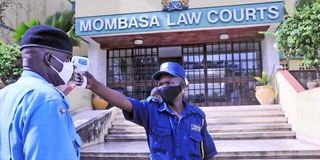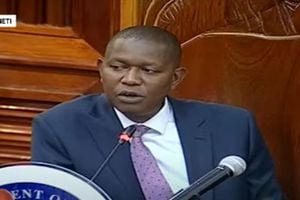Times have changed, but not so for Kenya’s security guard

A security guard checks the temperature of a police officer outside the Mombasa Law Courts on July 9. Many guards have been thrust into the frontline in the battle against Covid-19
What you need to know:
- They are expected to enforce the measures put in place by the government to curb the spread of Covid-19 – to screen everyone that goes into the buildings they guard, ensure that everyone sanitises or washes their hands and that they wear a mask, in the process putting them at a high risk of contracting the virus.
In March, when Kenya announced its first case of Covid-19, KNPSWU threatened to withdraw their members if the government did not guarantee a safe working environment at their places of work.
Once upon a time, security guards, then known as watchmen, were only stationed in affluent homes, godowns or factories to deter thieves and robbers. They were usually men wrapped in Maasai shukas, armed with clubs or spears, the ensemble complete with hardy sandals made of car tyres.
And then robbers became more daring and sophisticated and begun to spread terror using more deadly weapons such as guns. After this came the terrorist, who came not only armed with guns, but with grenades and bombs, factors that gave rise to today’s security guard, who goes through some form of formal training that is supposed to prepare him physically and mentally to better know how to act when confronted by the modern-day criminal.
But is this smartly-dressed and professional-looking security guard with a club and a whistle, and whom employers entrust their multimillion-shilling properties with, a match for criminals with blazing guns and bombs? Furthermore, today’s robber or terrorist looks and dresses like any respectable person, the terrorist, for instance, could be a university student, how, therefore, is a security guard to pick out one from a crowd?
TERROR ATTACKS
This is a debate that began as early as 2011 following the worrying rise in crime and terror attacks in the country.
It would culminate in the gazetting of new regulations on the operations of firms licensed to offer security services on July 2019 by Interior Cabinet Secretary Fred Matiang’i.
Welcoming the move, Kenya National Private Security Workers General Secretary Isaac Andabwa, said: “This is good news because the country is grappling with terrorism and armed robberies which put the lives of private guards at risk…you cannot stop an armed robber with a rungu.” However, the National Assembly would block the regulations, which would have doubled security guards’ minimum wage and given them the mandate to carry firearms. Part of the recommendations gazetted included a requirement that private security companies pay a minimum of Sh25,000 for day and night guards, an amount that was more than double what most security firms currently pay.
And then Covid-19 came along, again placing Kenya’s security guards on the line of fire. They are expected to enforce the measures put in place by the government to curb the spread of Covid-19 – to screen everyone that goes into the buildings they guard, ensure that everyone sanitises or washes their hands and that they wear a mask, in the process putting them at a high risk of contracting the virus.
Calling for the government to ensure a safe working environment for security guards, Mr Andabwa noted that security guards are the first individuals that come into contact with all the patients visiting a hospital, including Covid-19 patients, and should therefore be considered frontline workers and given an allowance since theirs was a risky job.
PRIVATE SECURITY
“We have been demanding that private security should be professionalised. But even before that, you can see we have been given additional roles as health workers. And we have been given this duty without prior training. We are calling on the government to consider guards when planning for the allowances,” Mr Andabwa said in an earlier interview, with Nairobi News, arguing that in spite of security personnel being essential workers, they were left out of the allowances set aside for those helping the government fight Covid-19.
In March, when Kenya announced its first case of Covid-19, KNPSWU threatened to withdraw their members if the government did not guarantee a safe working environment at their places of work.
Mr Kennedy Otieno* is a security guard with one of the security firms in the country. The 42-year-old father of three has been doing this job for five years now. A night guard in Nairobi, he earns Sh13,500 a month, and though it is a welcome leap from the Sh6,000-a-month he earned guarding a neighbourhood comprising of eight homes in Kiambu County, this is still not enough to sufficiently take care of his family. He worries what would become of his family were he to contract Covid-19.
“If I got sick today, I don’t know what would happen to my family – my wife does not have a stable income,” he says. He adds that though his company held a one-hour meeting where a doctor was invited to talk about Covid-19 with them and how they could protect themselves, he says that he still does not feel safe at work. Nonetheless, they are expected to buy their own masks and sanitiser, an added expense that he cannot afford.
Before Covid-19 came along, his two greatest fears were coming face-to-face with an armed robber, or terrorist for that matter. Now, every day that he reports to work, he risks exposure to a disease that is spread through touch and through the air.
IRRESPONSIBLE BEHAVIOUR
Irresponsible behaviour of the people he is expected to screen also puts him at risk of the virus. “Some people approach us with either no masks or their masks lowered,” he adds.
Using Mr Otieno’s story as reference, though Kenya’s ordinary security guard looks more professional and his roles have increased, little else has changed, he is still paid little and is still armed with a club which he is expected to deflect bullets and bombs with.





